It Was a Very Good Year ...
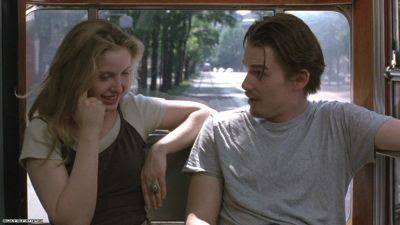
In 1995 I was working the midnight shift in a grocery store in Anchorage, Alaska. Some nights no one ever came in and on holiday weekends, when it was the most deserted, the workload was minimal. I was stuck working the entire Thanksgiving holiday that year and the night after Thanksgiving evening was like a ghost town. We had pretty much shut down all operations. The doors remained opened, but I don't recall anyone coming in.
Around 3am, I remember locking up the only open cash register and then taking a seat on a brown leather recliner in front of a TV in the video rental area and I opened a new copy of Before Sunrise, popped it into a VCR, made a cup of coffee and watched it from beginning to end.
Saying this film had an effect on me is an understatement. I remember watching Before Sunrise and feeling like it had woken me up from the fog of the last few years I was trapped in. I wasn't living like I had a dream, a direction or even felt like I had any control over my life whatsoever. Possibly every twenty-something goes through this as well. The listless and directionless period every young adult has to fight through trying to define themselves. It's probably just the question of 'how long' does that period last in most people's lives? In my own, it went on far too long, but even when I woke to it, I wasn't necessarily suddenly empowered with any new ability or gifted with the tools to fix it. I was just aware and I needed to make changes.

Before Sunrise was a beautiful movie that I found honest, endearing and what a lot of the most spontaneous moments in real life both looked and sounded like. It's a description of moments that had previously been left uncolored. There have been a few films that have done something similar, like 'Mind Walk' (1990) with Sam Waterson, Liv Ullman and John Heard. But that film, as inspired as it was, was different.
That morning, high on caffeine and sleep deprived, I quit my job and reevaluated everything I was doing and wondered deeply about everything that I wasn't. I felt compelled and I knew I had to make a change. I was taking classes at the University of Alaska, Anchorage and working towards a degree in history. The semester didn't wrap up until the second week of January, so I was stuck in place for at least the next month. I had some money, a car and would survive, but I knew I had to get as far from Alaska as possible.
I once wrote about the events that surrounded me leaving Alaska, but that was a handful of years previous and a different situation. That book has done well for itself and I'm always thankful of the letters I receive from those who read it.
Over the years when Richard Linklater added new chapters to his story which he had originally drafted with Kim Krizan, I noticed them in peripheral vision of my busy life. The continued writing of the story with every new chapter seemed to fall into the hands of Linklater, Julie Delpy and Ethan Hawke. I had read about this change in writers before I saw the second installment and I hesitated seeing it as it struck me as problematic of itself. An article in the Los Angeles Times worried that it would lose its allure. It would now become actors fashioning a vehicle to showcase themselves talking, rather than two writers crafting dialogue and scenes to go on a journey, make discoveries and put the viewer inside of that story as an omniscient to their own magic. I was afraid the second installment wouldn't work and skipped the theatrical release.
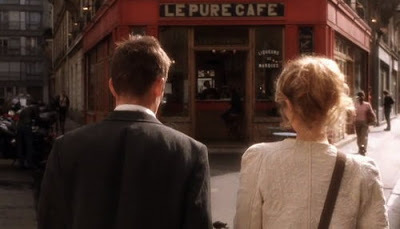
By 2004, I was living in Los Angeles, writing almost everyday and even taking bit parts in movies and hiring out to develop, edit and be a part of the creative process for other screenwriters. My life had changed. I had realized my dream even if I hadn't yet achieved it, or had a clear path to making what I did have any better. I wasn't making a living at it yet, but I wasn't buffing grocery-store floors, emptying trash or salting sidewalks at 3am anymore. I was however still living in a fog and heavily underwater with real life concerns of keeping a roof over my head, eating and maintaining my marriage with a wonderful lady who I knew needed me. Being needed was probably the newest experience for me and I was at least capable enough to recognize that. I was now a decade away from that Grocery Store in Anchorage, Alaska. If I saw a kinship in Jesse and what he was doing, it wasn't a mistake.
When I sat down a few years later to watch the second installment, Before Sunset, my wife was now pregnant with our son and we were preparing to change the course of our lives and what we were doing. It wasn't going to be just about the two of us anymore and my relationship was much further along and I was happy. I had decided to focus on novel writing and I had wrapped up a final screenplay for a friend and begun the first half of a novel that I finished earlier this year, 'Waiting for Andre.' I had also begun outlining and gathering up my old journals to write 'Greyhound.' Greyhound would be a book that would make me a lot of money, send me to conferences, book signings, author parties and all those things we dream about when becoming a 'famous writer.'
Before Sunset was interesting in the fact that it told the story of Ethan Hawke's / Jesse's success as a writer and how he had fallen in love with Julie Delpy / Celine and hadn't been able to get past her. He admits in the story that he wrote the book about them and their previous one-day encounter with the express intent of trying to find her and continue his relationship with the person he thought to be his soulmate. The whole story has a magical aspect to it, it's vibrant, moving, joyous and still has a lot of honesty all these years later. It holds up perfectly.
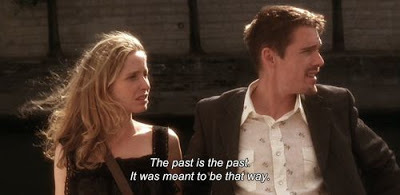
As an author who writes about his own life, I've been guilty of doing the same thing Jesse did. Looking back on the juxta-position of it, I can only laugh realizing I was making the same mistakes writing about the intimate relationship between myself and another person. The only difference is that in the land of make-believe, Jesse's book was a best-seller. My own sold nominally, made a decent amount of money and was well-received. I was gifted with more reader mail than I was reviews, but thankful for all of it. I never wrote any of my books in order to get the attention of the person in the book, nor as an attempt to get back involved with them like Jesse. Even when you're being honest about someone and portraying them over the course of 300 pages, it's unlikely they're going to appreciate how they're portrayed. Even when they're the hero. It's a hard lesson to realize because admitting that some people would prefer complete anonymity is difficult to understand, especially if you're a writer.
While most Linklater's story rings true and holds on to the same fiery energy the previous film had, it opens the door on something, at least to me, quite disturbing. In the first film, Celine jokes about being a psychopath and killing her roommate and comes across as an off-handed quip. Something people say in the course of a conversation to merely add a jolt of energy and perhaps a laugh. In the second film, it revisits this disconnectedness and the lovable and sincere Delphy has now seemingly written herself as a Holden Caulfield character, who is now dark, lost, unable to connect to anyone, unable to know love, feels like her ability to love was somehow 'magically' stolen from her by Jesse and his book and thus begins something quite different for each of them. This is dialogue straight from her mouth. Jesse believes he's embarking on the great love of his life and his dialogue reflects this. Celine has warned him she cannot love and yet accepts him into her life, and there's almost a 'you've been warned' tone to her behaviour towards him as she takes him in the last few minutes on a long-winding circuitous route upstairs to her apartment. Those last five minutes are like an omen of the film to come next.
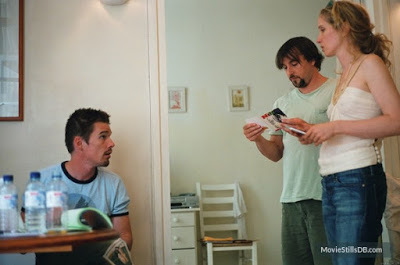
When this chapter ended, I wasn't left with the dark feelings I've highlighted here. I wasn't able to see them in the eyes I have now, nor were we gifted with the very dark third act that Linklater, Delpy and Hawke would create in 2014. I'm also not the first person to highlight those shades about Before Midnight either. Most viewers came away from the third film feeling the same way. The ending of Before Sunset ended for most with very hopeful and touching tones and everyone left the theatre or stopped their DVD's thinking that life would be what it was supposed to be for Jesse and Celine and that a third film, if it ever came, would be a family romp full of kids, problems and the juggling of life that people often have.
Years later, here we are. It's the late summer of 2018. The film has been out for four years and I've finally found time to sit down and dedicate myself to viewing it. When I saw it available on sale on VUDU streaming, I realized I should sit down and watch all three over the course of three early evenings. So, I did that. At 11pm on a Wednesday I fired up the first installment, Thursday night the second, and then Friday night the third.
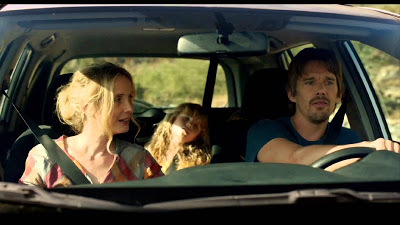
I don't need to highlight what's been going on in my life in great detail for this third part. My son is now eleven years old. He went off to camp this summer two times, once at the beginning of summer, which was the first time he'd been away from us for more than a night, which was excruciating, even though he returned home telling us that he had a wonderful time and loved camp. The second camp trip was at the end of his summer and it only seemed to bother my wife as he was out on Catalina Island with the YMCA, swimming in the ocean, jumping off the pier and supposedly having a blast. She stayed awake almost every night stuck addictively watching shark week. She said she couldn't sleep and was worried about her little boy away at camp and the possibility that something happened.
“Don't worry. If anything happened, they'll call.”
Not much happened at camp. Fox came home to report that he didn't have a good time, he got in trouble several times for not listening, talking back and was even pushed around by another kid who everyone in his cabin was fully aware of being a bigger brat than he was. The problems of life. I knew that camp was a 50/50 scenario. Not every experience is going to positive but that it would at least be a learning experience. Much like everything that happens between Celine and Jesse. It was ridiculous to think that we would drop in on them again and not see some level of dysfunction operating between the two. However, the basic premise of the tale seems to be cast aside. Two people meet up, have limited time and then try to make the most of their encounter by taking a walk to give them some space and have a chat about what's important to them. This is not the set up any longer.
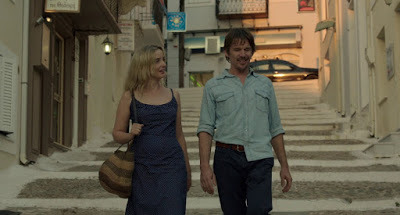
In Before Midnight, whether it was intended or not, Celine is now written as a completely deranged and psychotic emotional mess and narcissistic harassing wreck. She's unhappy still and now literally despises Jesse on every level. As participant, we don't know if it's because of her psychological personality that was just a joke in the first film and then fully developed into midlife, or if it was because of Jesse's choice of writing about them in his bestseller. There's a scene at a hotel where a young wife asks Jesse to sign a book for her as it meant everything between her and her husband. Celine rolls her eyes so hard, you wonder if it's going to break the camera lens. Then she asks Celine to sign the book and you wonder if you're about to witness a pea-soup scene from the Exorcist. Delpy's face turns almost green with disgust and you wonder if she's going to have a breakdown right at the counter.
The idea that Delpy and Hawke had an honest conversation Before Writing this third installment and showing the mess that's often entwined in real relationships is admirable. I've always assumed that both characters wrote their own parts, from all the cast interviews I've read between the three of them, that seems to be the case. This method strikes me as the best way to craft the idea that Linklater and Krizan originally begun. Wanting to show that at times relationships can tear at one partner and yet build another, often being one-sided and a display of the worst of all of us. That one person is there to carry the other like in that pop song from both of these actors late teen years is poignant, but taking it as far as they did, dismantles the storyline for no reason other than to have Julie Delpy dump all over Ethan Hawke in an endless manner all while we just wait for a reason for the spectacle. She's like a female Van Gogh here and we wonder if she's at breaking point and going to do something rash. I wanted to ask Delpy why this kind of hatred was necessary? It was cynical at best and troubling and sad at most. She becomes Holden Caulfield personified and even seems to venture into Mark David Chapman territory where she just wants to assassinate her now negative obsession that she's in orbit of. Everything is a reason to hate him and Jesse keeps trying to find some common ground. Almost foolishly. But then you realize ... it's just one day. One day in a very long relationship.
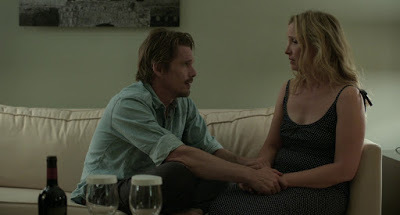
While it's easy to point and say too many midlife relationships are like this, the opposite is also true and some people's mid-life relationships are much more fulfilling, honest and less combative than portrayed here. The one variable that seems to get people worked up about Before Midnight is the nasty, argumentative and completely disconnected nature between the couple that consumed the third film.
Linklater stated that these films are a Rorschach test for your own relationship, but I think that sounds almost like a cop-out in not recognizing the problems the third film had, whether intentionally or not. However, all creators are cursed with this spiritual fortitude in regards to their work as it has to stand on its own and live its own life separate from the creators. It's now just as much ours as it was theirs when they made it, flaws, scars and all.
When you read a lot of the commentary on this third film, whether it's professional or just from the general public, everyone remarks about it creating a trilogy and how the arc wraps up the story, even the creators have stated as much. I personally didn't feel like that at all. I've actually been feeling like these movies are closer to seasons. Spring, Summer, Fall and Winter. Lives are actually lived like that more than a three-act melodrama. Most people usually don't sit around long enough for the fourth act however. In Kabuki theatre, sure. Most Western mystery traditions and storyforms? No.
I don't know if some viewers would go along for the journey again after seeing what happened in Before Midnight, but maybe a decade passing will soften that blow as well as people's feeling's about Celine's internal madness. Anything is possible. Maybe these films will touch a nerve on yet one more generation and find a way to enshrine them in their lives, too.
The next film could possibly be the last, rounding out the tale where we now deal with real loss, and not just the superficial loss of self that we see both Jesse and Celine battling over in the this third act. It would be drastic, but Jesse dealing with the loss of Celine would be one direction. Celine being shown in glimpses and memories, trapped in her own full-blown rejected Van Gogh Madness, Attacking her family, herself and Jesse still. Where she ends up taking her life in a fit of emotional desperation. I can almost hear Frank Sinatra singing 'It Was a Very Good Year' in the background setting the tempo and placing our characters in somewhere so far unseen, but expected. Maybe Alaska.
Rich Linklater might interject here and say 'The movie opens with a close up on Jesse. His hair now as gray as puffy rain clouds over farmland. He's reading the lyrics of 'It Was a Very Good Year' aloud in a book store with dramatic effect as it's the opening of his new novel. That's all I got so far, what do you two think?” Rich sits unblinking for a response while Hawke and Delpy pensively look on evaluating, not knowing what to say, just as they likely did with the previous two films.
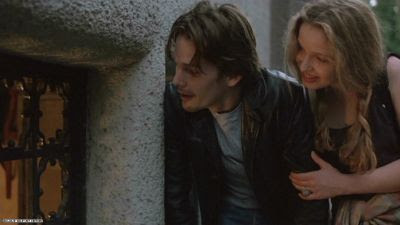
It could also go the other way where Celine is now mourning the loss of Jesse after something tragic and she has to reevaluate her relationship with him over the years. Feel the loss of him as a husband and father, the good and the bad. Both versions would be equally hard to take, but equally compelling. I think at some point this conceived notion of mine is likely a film that will come to pass and hopefully we'll yet see these two and their relationship once again. My wife asked what's so special about these films, and the answer is an easy one, at least to me. These examples are touchstones for others. A slice of reality to show you you're not alone in whatever it is you're going through. Good or bad. Especially the bad. Jesse's overwhelming push at the end, and Dad example was what most good husbands and spouses both know. Just make it till tomorrow and whatever it is won't seem so bad or feel so destructive. Get through it.
Even with the rough, unpaved nature of it. Midnight stands just as beautifully as the others, even though, it's arguably the hardest pill to swallow.
***
Published on August 21, 2018 22:59
No comments have been added yet.



